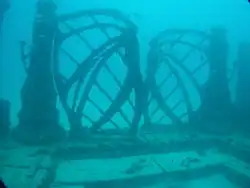| Neptune Memorial Reef | |
|---|---|
 The Neptune Memorial Reef's underwater gates. | |
| Details | |
| Location | |
| Type | Burial-at-sea underwater columbarium |
| Size | 16 acres (6.5 ha) |
The Neptune Memorial Reef is an underwater columbarium in what was conceived by the creator as the world's largest man-made reef (covering over 600,000 square feet (56,000 m2) of ocean floor) at a depth of 40 feet (12 m) ).[1] It was originally conceived by Gary Levine and designed by artist Kim Brandell and known as the Atlantis Reef Project or the Atlantis Reef[2] As of 2012, the Reef occupies a one-half-acre (0.20 ha) space, but a planned expansion 16 acres (6.5 ha) is underway. The city design involves underwater roads leading to a central feature with benches and statuary.
The place was chosen at 3.25 miles (5.2 km) off the coast of Key Biscayne, Florida. It is a type of burial at sea and the first phase is estimated to be able to accommodate 850 remains,[3] with an eventual goal of more than 125,000 remains.[4] Though often referred to in news articles as an underwater mausoleum or underwater cemetery, the Neptune Society Memorial Reef meets the criterion for neither. Cremated remains are mixed with cement to form features of the Reef, and memorial plaques are added.[5] The Reef is more correctly identified as a cremation memorial site.
The man-made reef, located three miles (5 km) off the coast of Florida's Key Biscayne, opened in 2007 after a number of difficulties, including permits.[6] After an extensive evaluation and permitting process, the Atlantis Reef Project has been permitted by the EPA, DERM, NOAA, Florida Fish and Wildlife, and the Army Corps of Engineers. One of the construction requirements was that the Memorial Reef be built to withstand the strongest storm in the last 100 years. During the permitting process, Hurricane Andrew, a category 5 hurricane swept through, requiring a re-engineering of the Reef.
The reef stretches across 16 acres (65,000 m2) of ocean floor designed as both a home for sea life and "a destination for divers".[6] The Neptune Memorial Reef lies in a special management zone. Boaters and divers are welcome, but no fishing or lobster-taking is allowed. Now that reef-building coral have developed at the site, the Reef can be properly identified as a coral reef.[7]
The Neptune Memorial Reef is actively working the site and expanded from less than an acre to its original permitted 16 acres.[8]
Famed chef personality Julia Child was interred in the reef upon her death in 2004.[9]
References
- ↑ Coleman, Les. "Florida's Exclusive Underwater Burial Ground". Public News Service -FL. Retrieved February 6, 2012.
- ↑ "Atlantis Reef Project Announces Partnership with Neptune Society". The California Chronicle. March 9, 2007. Archived from the original on July 8, 2011. Retrieved March 7, 2009.
- ↑ Orkin Emmanuel, Lisa (May 12, 2008). "Artificial reef near Miami is cemetery, and more". Associated Press. Retrieved March 7, 2009.
- ↑ Orkin Emmanuel, Lisa (May 12, 2008). "Watery graves offer a haven for divers". The Guardian. Retrieved March 7, 2009.
- ↑ Harrigan, Stephen. "Artificial Reefs". National Geographic. Archived from the original on January 22, 2011. Retrieved February 9, 2012.
- 1 2 Nolin, Robert (July 12, 2009). "Off Florida, a cemetery under the sea". Los Angeles Times. Retrieved November 26, 2009.
- ↑ "The Neptune Memorial Reef". Trident Society. Retrieved 16 January 2021.
- ↑ Robertson, Linda (March 21, 2018). "When these people say you'll be sleeping with the fishes, they're not kidding". Miami Herald. Archived from the original on June 26, 2018.
- ↑ Neptune Memorial Reef is an underwater mausoleum for cremated remains